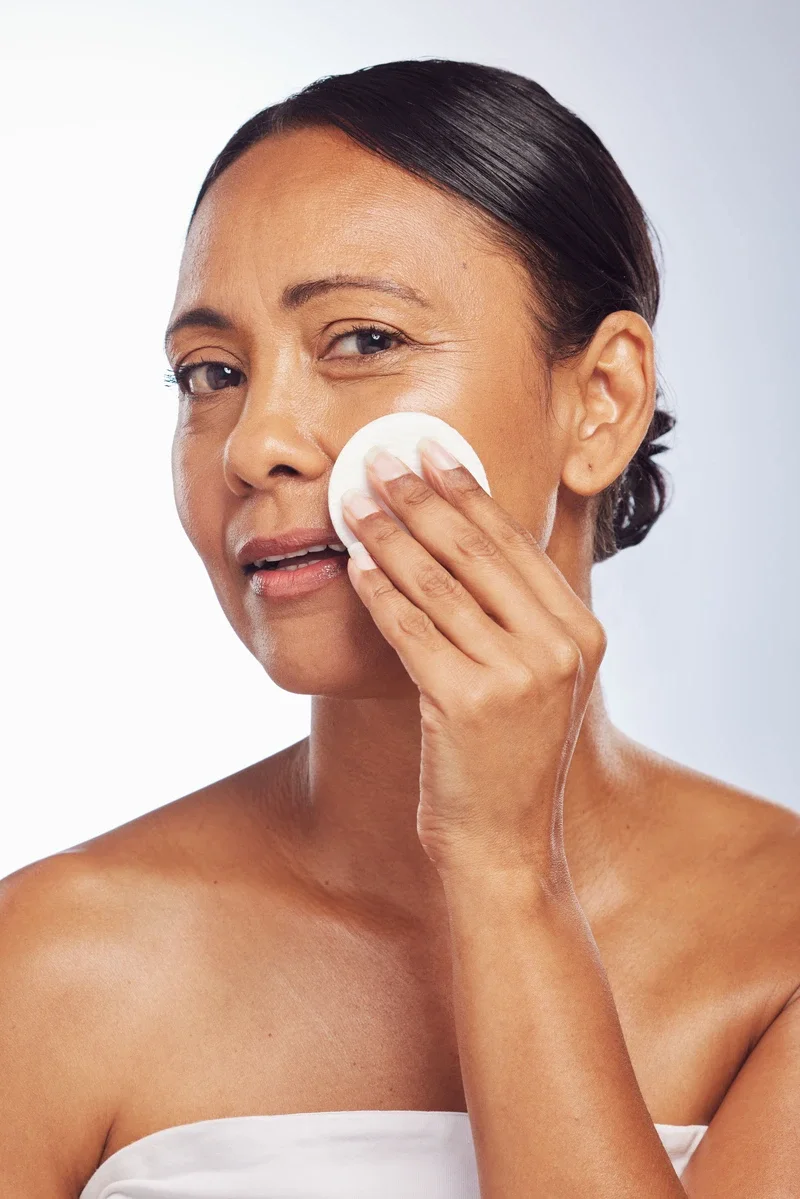Skin changes are a natural part of aging. Many people first experience breakouts during puberty, but pimples can extend into adulthood. Acne can develop at any age, and for some people, it can persist into their 30s or 40s. Adult acne is becoming more common, affecting approximately 15% of women.(1)
Oil gland secretions, clogged pores, bacteria, and inflammation all contribute to the development of acne. However, adults may face additional risk factors, including increased medication use, certain health conditions, and fluctuating hormone levels due to pregnancy or menopause.(2)(3)
As people age, the skin becomes less oily, more sensitive, and less tolerant of the treatment products often used in adolescence. Additional skin conditions, like rosacea, can further complicate treatment approaches. Finding effective treatments for adult acne is important to protect against skin damage, scarring, and blemishes.
Common Types of Adult Acne
Adult acne can be categorized as either persistent or late-onset. People with persistent acne develop breakouts in adolescence that continue into adulthood. Individuals with late-onset acne experience breakouts after the age of 25.(4)(5)Acne cases are further classified by severity into Grades 1 through 4, based on the type of skin lesions, which include the following:(6)(7)
Comedones: Small pimples that develop from clogged pores, commonly referred to as whiteheads or blackheads
Papules: Inflamed pimples that appear red on the skin’s surface
Pustules: Inflamed, pus-filled bumps that resemble blisters
Nodules and Cysts: Multiple pustules that develop into firm lumps. Cysts may contain fluid or other material trapped beneath the skin. These kinds of breakouts are known as nodulocystic acne.
Acne at any stage of life is largely influenced by hormones. Women are more likely to be affected by adult acne than men, which is why hormonal acne is often referred to as adult female acne (AFA). Breakouts that occur specifically during the menopause transition are an acne subtype known as menopause acne.(8)(9)

Best Adult Acne Treatments
Acne varies in severity depending on age, sex, and hormone levels. There is no single treatment that can address all types of acne for every patient. However, common treatment goals include preventing and resolving acne and scarring. Whether breakouts occur during adolescence or develop later in life, there are a number of ways to manage them. Here are some of the best treatments for adult acne.
1. Over-the-Counter Solutions
For mild cases of adult acne, certain topical products may be effective and can be purchased without a prescription. Many of these products contain benzoyl peroxide, which is made up of antimicrobial chemicals that help break up whiteheads and blackheads. Potential side effects may include dryness and skin irritation.(6)
Pairing a gentle facial cleanser with an oil-free moisturizer can also be effective in reducing adult acne. Light moisturizers labeled as “non-comedogenic” can protect against clogged pores and subsequent breakouts.(10) Additionally, daily use of a broad-spectrum sunscreen can prevent acne scars from darkening.
2. Prescription Acne Medication for Adults
Prescription medications may be recommended to treat moderate to severe cases of adult acne. First-line treatment methods often include topical retinoids, which are derived from vitamin A. Although retinol falls under the category of retinoids and can be found in many over-the-counter (OTC) skincare products, topical retinoids like tretinoin, tazarotene, or trifarotene require a prescription.(6)(11) Currently, low-dose adapalene is the only topical retinoid approved by the U.S. Food and Drug Administration (FDA) for OTC use.(12)(13)
Azelaic acid is another topical prescription medication with antimicrobial properties that can prevent breakouts and decrease inflammation. It can also help reduce the hyperpigmentation left by acne marks.(9)Adults with severe nodular or cystic acne, as well as individuals with moderate acne that has not responded to other treatments, may be prescribed the oral medication isotretinoin. Possible risks and side effects include skin irritation, muscle pain, rash, birth defects, and liver damage, among others.(14)(15)
Acne can also be a side effect of certain medications. Individuals should speak with a healthcare provider to determine whether their medications could be contributing to worsening acne.
3. Hormonal Acne Treatments
Hormonal medications, such as combined oral contraceptives or spironolactone, may be beneficial for individuals experiencing adult female acne or menopause acne.(6)(14) Spironolactone helps regulate oil gland secretions. A study published in the European Journal of Dermatology found that low doses of spironolactone reduced facial skin lesions in women between the ages of 20 and 52 who had not responded to isotretinoin.(16)
Hormone replacement therapy (HRT) can help manage acne related to fluctuating hormone levels during the menopause transition. With a medical provider’s approval, the following bioidentical HRT options may be used to address skin changes and other menopausal symptoms.
Facial Cream: Estriol face cream with tretinoin can help rejuvenate the skin by reducing the appearance of wrinkles and evening texture.
Body Creams: Body creams containing estrogen or a combination of estrogen and progesterone are effectively absorbed into the skin and can help relieve common menopausal symptoms.
Estrogen Patches: Transdermal HRT is directly absorbed into the bloodstream, bypassing liver metabolism.
Oral Medications: Compounded bioidentical HRT tablets or capsules can restore the body’s natural levels of estrogen and progesterone, which decline during menopause.
4. Home Remedies and Natural Treatments for Adult Acne
Lifestyle changes and certain complementary and alternative treatments may help improve adult acne. These remedies should not be considered a substitute for medical treatment, but they can be beneficial when used alongside a healthcare provider’s recommendations. The following treatment methods may help prevent breakouts in adulthood:
Supplements: Green tea contains chemical compounds with antimicrobial, antioxidant, and anti-inflammatory effects. Some research suggests that green tea extract may improve mild to moderate acne and help reduce oil production.(18) Tea tree oil is another commonly used remedy that may help reduce breakouts due to its anti-inflammatory and antimicrobial properties.
Alternatively, jojoba oil has been used throughout history for skin and scalp care. Known for its anti-acne properties, jojoba oil has been incorporated into various pharmaceutical products.(18)(19) Additionally, certain studies indicate that witch hazel extract may also help reduce inflammation and hydrate the skin.(18)(20)
Supplements can cause side effects and may interfere with prescription medications. Since scientific evidence supporting their health benefits is limited, individuals should consult with a healthcare provider before starting any new supplements.Stress Reduction Techniques: Hormone levels shift with stress, which can cause inflammation and stimulate the skin’s oil glands. Stress can also dehydrate the skin, increasing the risk of acne and other skin conditions, such as psoriasis and atopic dermatitis. Taking steps to reduce stress may help prevent flare-ups. For some people, this may take the form of medication, mental health counseling, or mindfulness meditation.(21)
Going to Bed Early: Sleep influences hormones and immunity, and good-quality sleep can help reduce the likelihood of breakouts. One study published in Clinical, Cosmetic and Investigational Dermatology found that women in China who went to bed after 11 p.m. had drier, less firm, and oilier skin than women who went to bed earlier. Later bedtimes were also found to affect the facial microbiome.(22)(23)
Dietary Modifications: While significant dietary changes are not recommended for treating acne, dairy products and foods that cause blood sugar levels to spike may exacerbate breakouts. Consuming these foods in moderation may help in maintaining healthy skin.(14)(22)
Acupuncture: Although more research is needed, studies have shown that acupuncture, which involves the insertion of needles into specific areas of the body, may be as effective as medication in treating acne and could have fewer side effects.(24)
Choosing the Right Treatment for Adult Acne
While acne can be an unexpected and sometimes frustrating part of aging, there are various treatments that can help. Options range from OTC products and prescription medications to HRT and natural remedies. When selecting the best treatment for adult acne, it’s important to consider factors such as age, health conditions, acne causes, and medication use. A licensed, board-certified dermatologist can help create a personalized treatment plan that’s best suited to individual needs.
